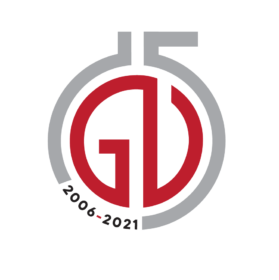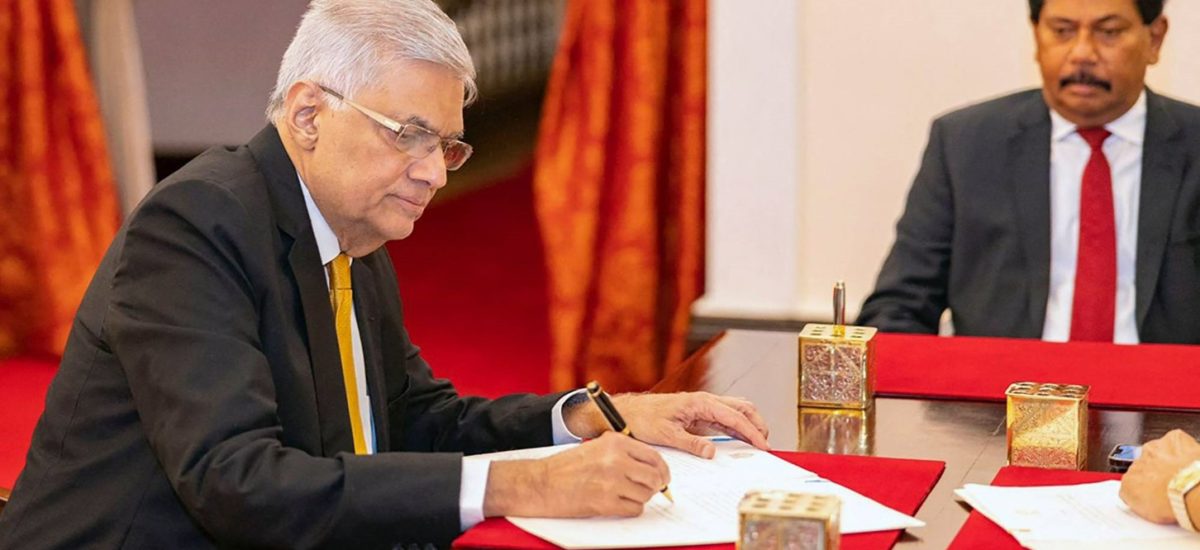Image Courtesy AFP
Order and stability have been the key words defining the early days of the Wickremesinghe presidency. They are touted as being the mantra that will set Sri Lanka on the path to economic recovery by his backers, and have been the butt of cynicism and ridicule by critics that question his legitimacy, let alone his ability to bring stability to a country facing its worst economic crisis in history.
Indeed, not many would argue that the appointment of Ranil Wickremesinghe as Sri Lanka’s eighth executive president is a contentious if not controversial one. The six time prime minister had lost his mandate to play any part in contemporary politics when he and his party were handed an overwhelming defeat at the 2020 Parliamentary elections. It was, if anything, an outright rejection of Mr. Wickremesinghe rather than the party he led. Yet after riding into parliament on the back of the sole national list seat allocated to his party, he found his purpose in the downfall of the Gotabaya Rajapaksa presidency. As the SLPP government crumbled, crawled and crashed, Mr. Wickremesinghe re-positioned himself as the olive branch-extending tactician at an All Party Conference called by President Rajapaksa in March 2022. In the absence of any other opposition party, Wickremesinghe was allowed to play the responsible adult in the room. His exchange with Finance Minister Basil was widely shared, commented on, circulated and even spoofed on social media. Amid some caution, it allowed for a re-launch of Mr. Wickremesinghe in the public eye, paving the way for his push for the highest office in the country.
Following his successful push for presidency in those interim months, it now appears that President Wickremesinghe’s time in office has thus far been defined by his legitimacy to hold that office, or its lack thereof, depending on who you ask; intricately balanced with his perceived ability to bring stability and restore some “sense of normalcy” to the urban landscapes.
The contract made, the contract broken
Gotabaya Rajapaksa’s ousting was built on months of concerted nonviolent popular protest. President Rajapaksa who was handed a resounding mandate through the polls, was still ousted when regular Sri Lankans took to the streets rather than wait their next turn at another election. It had become clear to many that not only had the SLPP government’s management of the treasury been disastrous but their entire claim to politics was one that was built almost solely on cooked up dynastical rule and majoritarianism, feeding off the distrust and paranoia amongst citizens it helped sow.
When the people elected Gotabaya Rajapaksa in 2019, they essentially signed a theoretical contract allowing him to have at his disposal an over centralised state structure and a powerful presidency backed by a two thirds majority in parliament. He in turn broke that contract placing the interests of himself and his family over that of the citizens of Sri Lanka, and thus placed himself vulnerable to be overthrown, and come July 9, that was exactly what happened. This sequence of events closely follows the social contract theory, specifically that written by John Locke. Indeed this concept of the social contract was at the heart of the discussions at the Aragalaya space at GotaGoGama.
The section of Locke’s writings on the social contract relevant here, in short, states that the (theoretical) contract to govern between ruler and ruled can be broken and revolution be instigated if the government does not act in the interest of its citizens. In his Two Treatises of Government, Locke summarises his argument as such:
“When political authority becomes tyrannical, that is when it is based on private rather than public interest, or when ‘illegal acts have extended to the majority of the people’ then the government is dissolved and the individual reclaims their natural liberty.”
The parallels are quite evident. The GotaGoHome movement, although extra-constitutional, was carried through the most legitimate means of people power, embodying the very precepts of Demos (citizen) and Kratos (rule). What occurred from April to early July was by popular demand. If it wasn’t felt on online communities that first kicked off the movement with a hashtag for the president to go home, it was felt in the frustrations that regular people spoke as the economy nosedived, it was felt on the streets when those frustrations had eventually boiled over.
It was people power in its purest form.
Stability versus the social contract
What is interesting is what came after however. How this moment of unbridled union in Demos and Kratos was then stifled through the political process where a man rejected by the public for breaking the social contract was replaced with another that never even had the mandate or the access to such a contract with the people to begin with. Nevertheless, Ranil Wickremesinghe’s appointment as prime minister, then acting president and then finally as president through a vote of confidence in parliament was completely legitimate as per the constitution. The implied underhand dealings and allegations of corruption that allowed for this sequence of events to fall into place can be inferred upon, yet the finality of Ranil Wickremesinghe at age 73 becoming Sri Lanka’s 8th executive president is something that has to be acknowledged as within the laws of the country.
The issue is that one would be hard pressed to find consensus on if his presidency is legitimate in the eyes of the people. President Wickremesinghe’s claim to power lay not in the legitimacy granted to him through a people’s mandate or an election, or even popular support but rather through happenstance, and his own making, sanctioned through a workings of a political system that is deeply distrusted by the public. Legitimacy in its strict definition is to do with legal procedure, that which is law of the land. But what is it that is the law of the land and for whose benefit is it?
“Laws represent the restraint of natural liberty”, answers Jean Jacques Rousseau, one of the central political philosophers whose ideas carried the French Revolution. A somewhat dangerous idea, no doubt, but one that can bear some relevance in the backdrop of how a state of emergency and now the use of the Prevention of Terrorism Act has defined the intense crackdown hundreds of activists that made the GotaGoHome movement possible. The law, as many Sri Lankans have now discussed and debated, is one that restricts the very fundamental spirit of the republic.
The gap between what is legitimate for the political class and what is legitimate for the people underscores the central issue that Sri Lanka faces in its political and state structures; the disconnect. Richard Ashcraft, a political theorist, writing on Locke suggested that “His work wanted to invoke a revolution in social relations to empower the marginal and the poor – cobblers and tradesmen, as well as gentlemen.” The GotaGoHome movement brought this revolution in class. It was a moment the often silent middle class joined in the struggle, empowering the forgotten and marginalised and calling for an end to the excesses of the state. It was a call for a new contract, one that has now been let go of to a large degree by the urban middle class; the advent of class politics and hierarchies being re-imposed once more, with the ascension of Ranil Wickremesinghe to the highest office.
The social contract between the people and their leaders underscores this very idea of stability. The position of a ruler or a president is not a hereditary, dynastical or divine appointment. A general divide on what and whom the social contract is between, undermines the idea of politics and thus the very idea of a politically stable society. Harmony between this relationship is what ensures stability, but in Sri Lanka, it is something that has increasingly become strained, problematic and flawed since its inception at independence.


